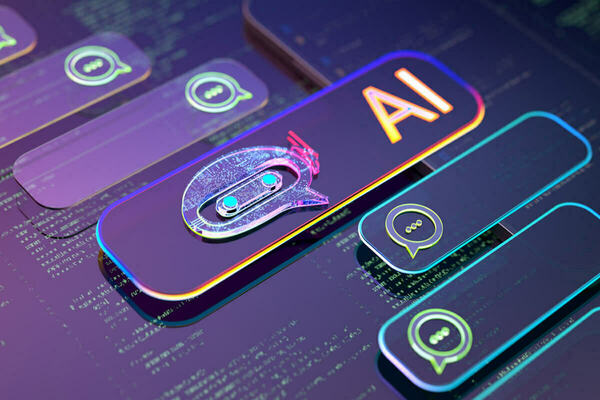Consumers prefer dealing with chatbots over humans when buying ‘embarrassing’ products online

Consumers are increasingly tired of interacting with chatbots in customer service. There are times, however, when people prefer chatbots, according to new research from the University of Notre Dame.
When purchasing “embarrassing” products like diarrhea medicine or acne cream, consumers would rather engage with a chatbot over another human, even when they are shopping alone at home, according to lead author Jianna Jin, assistant professor of marketing at Notre Dame’s Mendoza College of Business. Jin’s findings, “Avoiding embarrassment online: Response to and inferences about chatbots when purchases activate self-presentation concerns,” were recently published in the Journal of Consumer Psychology.
Jin, along with Jesse Walker and Rebecca Walker Reczek from Ohio State University, looked at how shoppers’ desire to avoid embarrassment influenced two types of interactions with chatbots: when a chatbot’s identity is disclosed, and when it is not disclosed and is therefore ambiguous.
Across seven experiments with more than 6,000 participants, the team created and used its own chatbot to study the intricacies of human-chatbot interaction. People shopped for hemorrhoid medication and anti-wrinkle cream, among other products.
In one experiment, participants were asked to imagine shopping for diarrhea and hay fever medications and were offered two online pharmacies, one with a human pharmacist and the other with a chatbot pharmacist. The medications were packaged identically, with the only difference being their labels for “diarrhea” or “hay fever.” More than 80 percent of consumers looking for diarrhea treatment preferred a store with a clearly non-human chatbot, which was not the case when shopping for hay fever medication.
Another experiment used a dating app enabled with either a clearly identified chatbot or human match agent that asked sensitive questions about things like body shape. Again, when facing sensitive questions, people disclosed more and preferred a clearly non-human chatbot match agent over a human agent.
Consumer embarrassment also plays a role when a chatbot’s identity remains ambiguous. When interacting with a chatbot that looks and sounds human, consumers who are more likely to be embarrassed when buying hemorrhoid cream, for example, are more likely to infer the agent is human and potentially avoid the interaction altogether.
“When it comes to sensitive purchases, if there’s any doubt about who they’re interacting with, perhaps because of a human-like profile picture, people will err on the side of caution and treat the AI chatbot as if it’s human to protect their self-image,” Jin said. “It’s a way of preparing for the worst-case social scenario. But give them a clearly non-human chatbot, and suddenly that self-presentation pressure vanishes because there’s no perceived judgment.”
When consumers know for sure they are interacting with a chatbot, they strongly prefer it over a human for embarrassing purchases. And they really want it to look and sound like a machine rather than the more human-like versions the industry is trending toward. These shoppers proved more willing to engage with a chatbot, choose a store that uses one, and even share email addresses and other personal information to get free samples.
“While our studies focus on classic ‘self-conscious’ purchases, the insight extends more broadly,” Jin said. “A car leasing company could use a clearly identified, machine-like chatbot to assist women in an industry where they may experience stereotype-based judgment.”
The findings can help guide companies in deciding when to deploy chatbots, why they work in certain contexts and how to design them effectively.
Contact: Jianna Jin, 574-631-1509, jjin5@nd.edu
Latest ND NewsWire
- University of Notre Dame joins the Global Coalition of Ukrainian StudiesThe University of Notre Dame has joined the Global Coalition of Ukrainian Studies after signing a memorandum of cooperation, formalized Sept. 24, at the Ukrainian Institute of America in New York City. Notre Dame joined four other American institutions that were also publicly welcomed to the coalition at this event: Arizona State University, Columbia University, Manor College and the Shevchenko Scientific Society.
- One year later, Inauguration Build a ‘dream come true’ for Habitat familiesOne year later, work on Inauguration Build 2024 is complete, offering shelter and so much more to five local families.
- Alumni Association and YoungND honor 2025 Domer DozenThe Notre Dame Alumni Association announced its 2025 Domer Dozen cohort, honoring 12 graduates ages 32 and younger for excellence in their contributions in learning, service, faith and work — the core pillars of the association’s mission.
- Faculty receive prestigious early career awards from National Science FoundationDuring the 2024-25 academic year, four researchers in the University of Notre Dame’s Colleges of Engineering and Science received early-career awards from the National Science Foundation.
- Notre Dame School of Architecture poised for global leadership through historic investmentThe $150 million gift represents an unprecedented commitment in the 160-year history of American architectural education. In recognition of this landmark gift, the school will be renamed the Matthew and Joyce Walsh School of Architecture at Notre Dame.
- Banks that identify fraudsters increase loyalty, retain more defrauded customers than others who never were compromisedIn a new research study, Vamsi Kanuri, the Viola D. Hank Associate Professor of Marketing at the University of Notre Dame’s Mendoza College of Business, found that banks that identify fraudsters earn customer loyalty and lose customers if they can’t say who was responsible for a fraudulent transaction.













